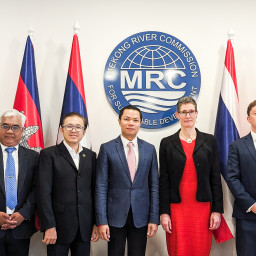Lao PDR Submits Notification on the Pak Lay Hydropower Project to MRC for Prior Consultation
Vientiane, Lao PDR, 14 June 2018 – The Mekong River Commission Secretariat has received an official notification from the Lao Government that it will undertake the formal process of prior consultation on its Pak Lay hydropower project in the Pak Lay area in the Lao PDR’s northern province of Xayaburi. The run-of-river dam will operate continuously year-round and produce 770 megawatts of electricity.
The Lao National Mekong Committee Secretariat submitted on 13 June 2018 the detailed description of the planned project to the MRC Secretariat for reviewing and informing the other Member Countries about the project’s scope and other requirements under the prior consultation process. With this submission for prior consultation, the Lao Government fulfills its critical obligation under the 1995 Mekong Agreement.
The MRC Secretariat will, within one month, review the document and verify its completeness against the prior consultation procedures before forwarding the case to the MRC’s Joint Committee (JC), a body consisting of four Member Countries’ representatives at the head of department level where the consultation takes place.
The prior consultation is part of the MRC’s procedural rules on cooperation on water use of the Mekong mainstream: Procedures for Notification, Prior Consultation and Agreement (PNPCA). Under the Procedures, any infrastructural project using the mainstream water during the dry season within the same basin, as well as during the wet season between two basins, must undergo the prior consultation process. Applicable projects include large-scale irrigation and hydropower development which may cause significant impacts on the environment, water flow and quality of the Mekong mainstream.
In the prior consultation process, with technical and administrative support from the MRC Secretariat, the notified Member Countries will review technical aspects of the project, assess any potential transboundary impacts on the environment and livelihoods along the riparian communities, and suggest measures to address those concerns. The Member Countries aim to come to an agreement on how the consulted case should proceed. It is not meant to approve or disapprove the proposed project. This process normally lasts six months, but it could be extended further by the JC.
The MRC has so far experienced three prior consultation cases – Xayaburi, Don Sahong, and Pak Beng hydropower projects, all of which are situated in the Mekong mainstream in Lao PDR. They all show successes, effectiveness and progressiveness of the 1995 Mekong Agreement and the MRC itself, the legendary Mekong spirit of the Member Countries’ cooperation.
For Xayaburi, the process has prompted the Lao Government and the developer to conduct their own environmental impact assessment and to invest hundreds of millions of dollars to revise the dam’s design to address the issues of fish migration and sediment, two of the main concerns raised during the prior consultation.
In the case of Pak Beng, the JC reached an agreement at the end of its six-month prior consultation process. The body issued a Statement, tasking the MRC Secretariat to prepare a Joint Action Plan (JAP) to provide mechanisms for ongoing feedback, data exchange, and knowledge sharing between Lao PDR and the MRC concerning the ongoing design, construction, and operation of the project.
“It’s obvious from the Pak Beng case that the JAP has transformed the PNPCA process. It has a clear endpoint with concrete decisions toward enhancing measures to avoid, minimize and mitigate potential transboundary impacts while enhancing good faith between and among the Member Countries,” says MRC CEO Pham Tuan Phan.
From these cases, in particular the Pak Beng case, the MRC has reviewed various aspects of the PNPCA to improve its application, including adequacy of documentation and early sharing of information.
“We have learned lessons from the previous cases and the success of the Pak Beng prior consultation process. This experience allows us to be more robust and prepared to assist our Member Countries to review the project, assess technical aspects and conclude in an inclusive and meaningful way,” says CEO Pham.
The Pak Lay hydropower project’s construction is expected to start in 2022 and finish in 2029. The commercial operation is set to begin in the same year after the construction finishes.
The MRC together with the National Mekong Committee Secretariats will facilitate national and regional consultations to solicit the public views on the case.
Read this news in Khmer , Lao, Thai or Vietnamese.
Note to editors:
The Mekong River Commission is an intergovernmental organization for regional dialogue and cooperation in the lower Mekong river basin, established in 1995 based on the Mekong Agreement between Cambodia, Lao PDR, Thailand and Viet Nam. The organization serves as a regional platform for water diplomacy as well as a knowledge hub of water resources management for the sustainable development of the region.
-END-





